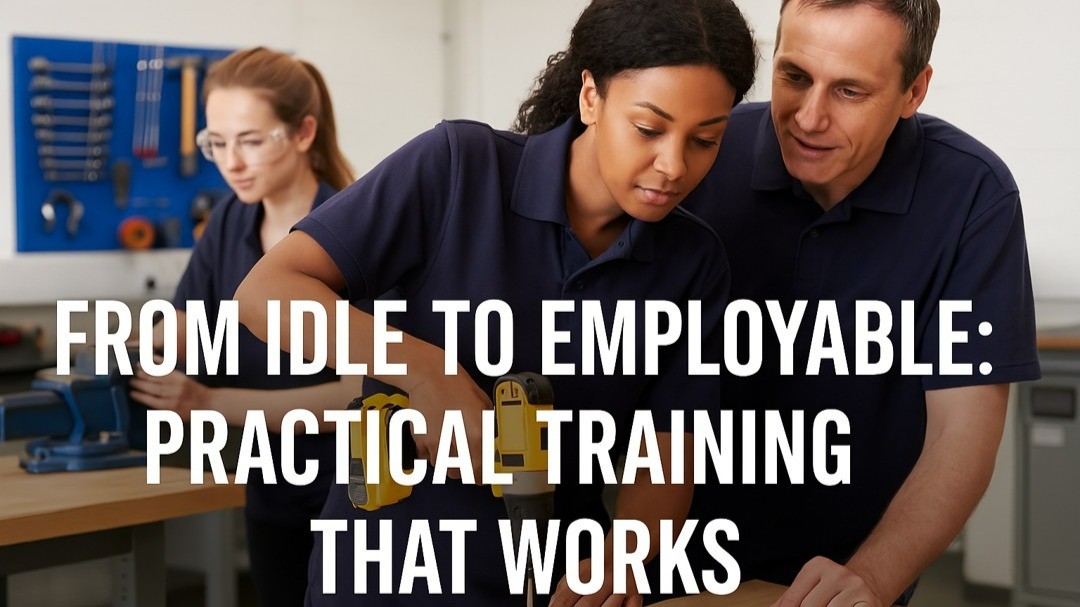Can mentorship close the global youth skills gap? Our latest paper explores how mentorship transforms knowledge into real-world ability—building confidence, practical skills, and brighter futures.
Continue Reading

Can mentorship close the global youth skills gap? Our latest paper explores how mentorship transforms knowledge into real-world ability—building confidence, practical skills, and brighter futures.
Continue Reading
The article highlights the urgent need for practical, market-aligned training that leads to real employment outcomes—an area where Duja Consulting is driving impact. It positions our expertise in workforce readiness and programme implementation and provides a compelling case for why our approach matters.
Continue ReadingSoft skills such as communication, leadership, and adaptability play a vital role in an organisation’s success, yet they can be difficult to assess within traditional performance management frameworks. These qualitative skills do not lend themselves to straightforward metrics, but there are effective strategies to incorporate and measure them. Today’s video explores how organisations can approach this challenge and ensure soft skills are appropriately integrated into performance assessments.
Continue ReadingToday’s video discusses the transformative role that effective training plays in South Africa’s agricultural sector. The video explores how tailored training programs can overcome challenges, empower workers, and revolutionise the agricultural landscape.
Continue ReadingIn today’s rapidly evolving business landscape, staying competitive requires organisations to embrace a dynamic approach to learning. A well-crafted learning strategy can not only upskill employees but also drive innovation, enhance productivity, and foster a culture of continuous improvement. In this article, we explore twenty proven ways to extract maximum value from your learning strategy, complete with case studies and insights from industry experts.
Continue ReadingThe gap between academic knowledge and real-world application is more pronounced than ever, and traditional classroom education, while foundational, often falls short in preparing students for the practical demands and dynamic challenges of their chosen careers. Employers are increasingly seeking candidates who possess theoretical knowledge and demonstrate practical skills, adaptability, and a proven ability to thrive in professional environments. This is where Work Integrated Learning (WIL) comes into play, offering a critical bridge between academic study and career readiness.
Continue ReadingCustomised internship programs are a pivotal bridge between academic learning and real-world application in professional development. These tailored experiences are designed not only to bolster the professional journey of interns but also to serve the strategic needs of the hosting organisations.
Continue ReadingInternships are crucial gateways for individuals entering the workforce, providing them with invaluable real-world experience. However, the design of these internships carries significant ethical implications that need careful consideration. As businesses strive to align their internship programs with their strategic objectives, they must also prioritise their interns’ personal and professional growth. This balance is not just a matter of regulatory compliance or public image but a foundational element of corporate responsibility and ethical business practice.
Continue ReadingEmployability is a significant concern for students, educators, and employers in the global job market. The traditional education model, focused primarily on theoretical knowledge, is increasingly supplemented with experiential learning opportunities to better prepare students for the workforce demands. Work Integrated Learning (WIL) has emerged as a pivotal strategy, blending academic studies with practical, hands-on experience in a professional setting. This hybrid approach includes internships, cooperative education (co-op) programs, apprenticeships, and industry-specific projects. WIL plays a crucial role in bridging the gap between academic and industry needs, making it a relevant and important tool in today’s job market
Continue ReadingMentoring and coaching, these are not just buzzwords, but powerful tools used in personal and professional realms to ignite development, supercharge performance, and fuel overall growth. While they may seem similar, they are not interchangeable. Each has its own unique purpose, techniques, and outcomes. In this introduction, we delve into the subtle differences between mentoring and coaching, providing a deeper understanding of their roles in propelling individual and organisational advancement.
Continue Reading